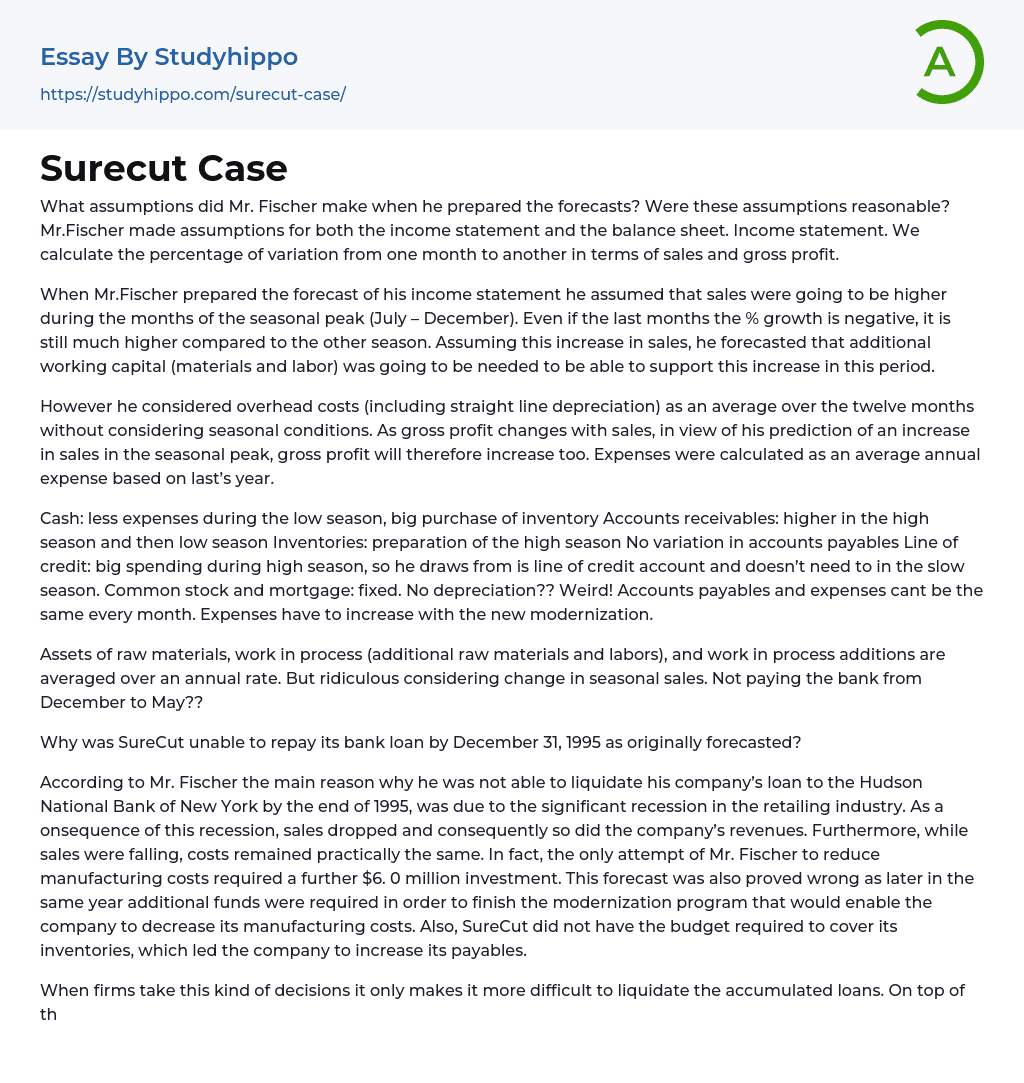What assumptions did Mr. Fischer make when he prepared the forecasts? Were these assumptions reasonable? Mr.Fischer made assumptions for both the income statement and the balance sheet. Income statement. We calculate the percentage of variation from one month to another in terms of sales and gross profit.
When Mr.Fischer prepared the forecast of his income statement he assumed that sales were going to be higher during the months of the seasonal peak (July – December). Even if the last months the % growth is negative, it is still much higher compared to the other season. Assuming this increase in sales, he forecasted that additional working capital (materials and labor) was going to be needed to be able to support this increase in this period.
However he considered overhead costs (including straight line dep
...reciation) as an average over the twelve months without considering seasonal conditions. As gross profit changes with sales, in view of his prediction of an increase in sales in the seasonal peak, gross profit will therefore increase too. Expenses were calculated as an average annual expense based on last’s year.
Cash: less expenses during the low season, big purchase of inventory Accounts receivables: higher in the high season and then low season Inventories: preparation of the high season No variation in accounts payables Line of credit: big spending during high season, so he draws from is line of credit account and doesn’t need to in the slow season. Common stock and mortgage: fixed. No depreciation?? Weird! Accounts payables and expenses cant be the same every month. Expenses have to increase with the new modernization.
Assets of ra
materials, work in process (additional raw materials and labors), and work in process additions are averaged over an annual rate. But ridiculous considering change in seasonal sales. Not paying the bank from December to May??
Why was SureCut unable to repay its bank loan by December 31, 1995 as originally forecasted?
According to Mr. Fischer the main reason why he was not able to liquidate his company’s loan to the Hudson National Bank of New York by the end of 1995, was due to the significant recession in the retailing industry. As a onsequence of this recession, sales dropped and consequently so did the company’s revenues. Furthermore, while sales were falling, costs remained practically the same. In fact, the only attempt of Mr. Fischer to reduce manufacturing costs required a further $6. 0 million investment. This forecast was also proved wrong as later in the same year additional funds were required in order to finish the modernization program that would enable the company to decrease its manufacturing costs. Also, SureCut did not have the budget required to cover its inventories, which led the company to increase its payables.
When firms take this kind of decisions it only makes it more difficult to liquidate the accumulated loans. On top of this, according to the company’s financial statements, SureCut seems to have extremely high receivables. To conclude this explanation we can say that SureCut was unable to repay its bank loan by the end of 1995, due to the industry’s recession, as well as, the poor management used to deal with this downturn.
Has SureCut’s financial condition worsened sufficiently to cause Mr. Stewart
any great concern?
Profit margins are good; in fact for each dollar of sales we have 10% of profit. There is no concern about profitability; even if the sales are not as good as expected Mr. Fischer found a way to have lower expenses so that his profitability wouldn’t suffer. The turnover ratio shows that the receivables are collected at a good rate. So SureCut’s clients pay in a reasonable amount of time. The main concern is the cash ratio. Mr. Fischer made too optimistic assumptions about his future cash-flows and has now a really low cash ratio which can indicate financial distress.
- Commercial Bank essays
- Debit Card essays
- Deposit Account essays
- Subprime Lending essays
- Accountability essays
- Accounting Software essays
- Accounts Receivable essays
- Auditor's Report essays
- Balance Sheet essays
- Cash essays
- Cash Flow essays
- Costs essays
- Financial Audit essays
- Internal Control essays
- International Financial Reporting Standards essays
- Management Accounting essays
- Principal essays
- Tax essays
- Bank essays
- Banking essays
- Corporate Finance essays
- Credit Card essays
- Currency essays
- Debt essays
- Donation essays
- Enron Scandal essays
- Equity essays
- Financial Accounting essays
- Financial Crisis essays
- Financial News essays
- Financial Ratios essays
- Financial Services essays
- Forecasting essays
- Foreign Exchange Market essays
- Free Market essays
- Gold essays
- Investment essays
- Legacy essays
- Loan essays
- Market Segmentation essays
- Money essays
- Personal finance essays
- Purchasing essays
- Retirement essays
- Shareholder essays
- Stock Market essays
- Supply And Demand essays
- Venture Capital essays
- Bankruptcy essays
- Earnings essays




